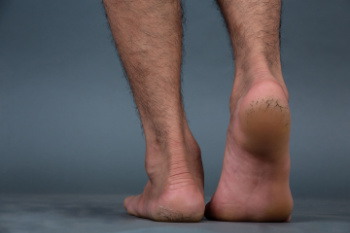
Cracked heels, also known as heel fissures, are a common foot condition where the skin surrounding the heel becomes dry, thick, and begins to split. This often occurs when the skin loses moisture and elasticity, leading to roughness and the development of painful cracks. One major cause is having naturally dry feet, which can worsen without proper moisturizing. Standing for long periods of time, especially on hard surfaces, puts constant pressure on the heels and can lead to skin breakdown. Dehydration reduces the skin’s ability to stay soft and flexible, increasing the risk of cracks. Additionally, being overweight can also add extra stress to the heel area, causing the skin to expand and split. Cracked heels may become painful, causing difficulty in completing daily tasks. If you have developed this condition, it is suggested that you contact a podiatrist who can offer effective treatment solutions, which may include prescribed medication.
Cracked heels are unsightly and can cause further damage to your shoes and feet. If you have any concerns, contact Donovan Gowdie, DPM from The Foot & Ankle Treatment Center. Our doctor can provide the care you need to keep you pain-free and on your feet.
Cracked Heels
Cracked heels appear unappealing and can make it harder for you walk around in sandals. Aside from looking unpleasant, cracked heels can also tear stockings, socks, and wear out your shoes. There are several methods to help restore a cracked heel and prevent further damage.
How Do You Get Them?
Dry skin is the number one culprit in creating cracked heels. Many athletes, walkers, joggers, and even swimmers suffer from cracked heels. Age and skin oil production play a role to getting cracked heels as well.
Promote Healing
Over the counter medicines can help, especially for those that need instant relief or who suffer from chronic dry feet.
Wear Socks – Wearing socks with medicated creams helps lock in moisture.
Moisturizers – Applying both day and night will help alleviate dryness which causes cracking.
Pumice Stones – These exfoliate and remove dead skin, which allows for smoother moisturizer application and better absorption into the skin.
Change in Diet
Eating healthy with a well-balanced diet will give the skin a fresh and radiant look. Your body responds to the kinds of food you ingest. Omega-3 fatty acids and zinc supplements can also revitalize skin tissue.
Most importantly, seek professional help if unsure how to proceed in treating cracked heels. A podiatrist will help you with any questions or information needed.
If you have any questions, please feel free to contact our office located in Watkinsville, GA . We offer the newest diagnostic and treatment technologies for all your foot care needs.
